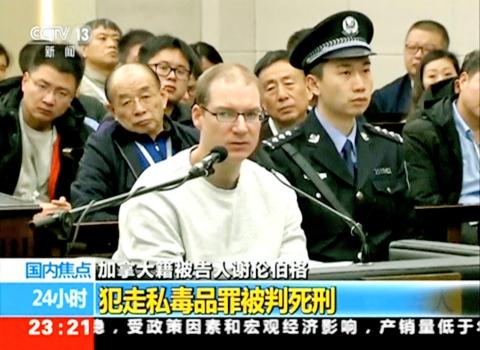China yesterday vociferously defended a court’s decision to impose the death penalty on a convicted Canadian drug smuggler, escalating a diplomatic row that experts say has descended into a high-stakes game of “hostage politics.”
The Chinese Ministry of Foreign Affairs blasted Canadian Prime Minister Justin Trudeau’s “irresponsible remarks” after he criticized the death sentence imposed on 36-year-old Robert Lloyd Schellenberg.
Beijing and Ottawa have been squabbling since last month, when Canada arrested Huawei Technologies Co (華為) chief financial officer Meng Wanzhou (孟晚舟) on a US extradition request related to possible breaches of Iran sanctions.

Photo: Reuters
In a move that observers see as retaliatory, Chinese authorities detained two Canadian citizens — former diplomat Michael Kovrig and business consultant Michael Spavor — on suspicion of endangering national security.
Then authorities revisited the little-known case of Schellenberg, who was sentenced to 15 years in prison in November for drug offences. A month later, an upper court took up his appeal and ordered a hasty retrial in the northeastern city of Dalian after ruling that the punishment was too lenient.
The timing and swiftness of Schellenberg’s sentence, and the inclusion of new evidence presenting him as a key player in a plan to ship 222kg of methamphetamine to Australia, has raised suspicion among observers.
“Playing hostage politics, China rushes the retrial of a Canadian suspect and sentences him to death in a fairly transparent attempt to pressure Canada,” Human Rights Watch executive director Kenneth Roth tweeted.
Donald Clarke, a George Washington University professor specializing in Chinese law, coined an even grimmer term for the situation: “death threat diplomacy.”
“The Chinese government is not even trying to pretend that there was a fair trial here,” he said.
Trudeau expressed “extreme concern” that China had “chosen to arbitrarily” apply the death penalty, but Chinese Ministry of Foreign Affairs spokeswoman Hua Chunying (華春瑩) denied that Beijing had politicized Schellenberg’s case, calling on Canada to “respect China’s judicial sovereignty ... and stop making such irresponsible remarks.”
Ottawa had issued a new travel advisory urging citizens to “exercise a high degree of caution in China due to the risk of arbitrary enforcement of local laws.” Beijing issued a similar response hours later, calling on Chinese citizens to “travel cautiously” after a Chinese citizen was “arbitrarily detained on the basis of a request of a third-party country,” an apparent reference to Meng’s arrest.
The court in Liaoning yesterday said its actions were “in compliance with the provisions of the Criminal Procedure Law,” the official Legal Daily reported.
China executes one or two foreigners every year — nearly all for drug offences, according to John Kamm, director of the US-based Dui Hua Foundation rights group.
Experts said retrials are rare in China, especially ones calling for a harsher sentence, but rights groups said that courts are not independent and can be influenced by the Chinese Communist Party.
“What’s unusual is how this case shifted from extremely slow handling to suddenly rapid fire movement,” Seton Hall University law professor Margaret Lewis said.
The rare decision to allow three foreign journalists to attend the hearing makes it “clear that the Chinese government wants [the] international spotlight on this case,” she added.
“The timing is suspect and certainly his nationality makes it all the more glaring,” she said.

The Taiwanese passport ranked 33rd in a global listing of passports by convenience this month, rising three places from last month’s ranking, but matching its position in January last year. The Henley Passport Index, an international ranking of passports by the number of designations its holder can travel to without a visa, showed that the Taiwan passport enables holders to travel to 139 countries and territories without a visa. Singapore’s passport was ranked the most powerful with visa-free access to 192 destinations out of 227, according to the index published on Tuesday by UK-based migration investment consultancy firm Henley and Partners. Japan’s and

NATIONAL SECURITY THREAT: An official said that Guan Guan’s comments had gone beyond the threshold of free speech, as she advocated for the destruction of the ROC China-born media influencer Guan Guan’s (關關) residency permit has been revoked for repeatedly posting pro-China content that threatens national security, the National Immigration Agency said yesterday. Guan Guan has said many controversial things in her videos posted to Douyin (抖音), including “the red flag will soon be painted all over Taiwan” and “Taiwan is an inseparable part of China,” while expressing hope for expedited “reunification.” The agency received multiple reports alleging that Guan Guan had advocated for armed reunification last year. After investigating, the agency last month issued a notice requiring her to appear and account for her actions. Guan Guan appeared as required,

Japan and the Philippines yesterday signed a defense pact that would allow the tax-free provision of ammunition, fuel, food and other necessities when their forces stage joint training to boost deterrence against China’s growing aggression in the region and to bolster their preparation for natural disasters. Japan has faced increasing political, trade and security tensions with China, which was angered by Japanese Prime Minister Sanae Takaichi’s remark that a Chinese attack on Taiwan would be a survival-threatening situation for Japan, triggering a military response. Japan and the Philippines have also had separate territorial conflicts with Beijing in the East and South China

A strong cold air mass is expected to arrive tonight, bringing a change in weather and a drop in temperature, the Central Weather Administration (CWA) said. The coldest time would be early on Thursday morning, with temperatures in some areas dipping as low as 8°C, it said. Daytime highs yesterday were 22°C to 24°C in northern and eastern Taiwan, and about 25°C to 28°C in the central and southern regions, it said. However, nighttime lows would dip to about 15°C to 16°C in central and northern Taiwan as well as the northeast, and 17°C to 19°C elsewhere, it said. Tropical Storm Nokaen, currently